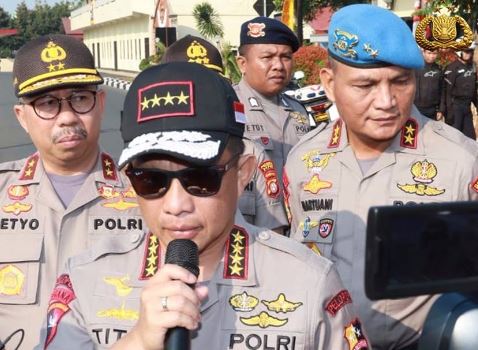Since the horrific suicide bomb attacks that took place in Surabaya in May, Indonesia’s anti-terrorist police have been tracking down anybody with connections to the extremist network believed to be behind the attacks, already using recently passed anti-terrorism laws to arrest not only those directly involved in the attacks but even those who have shown sympathy for their cause.
Indonesia’s National Police Chief Tito Karnavian said the new law was used as the basis for the recent arrests of nearly 50 people in Central Jakarta’s Bendungan Hilir and Kemayoran neighborhoods suspected of having connections to Jemaah Ansharut Daulah (JAD), the ISIS-affiliated terrorist network believed to be behind several terrorists attacks over the last few years including those in Surabaya.
“We used the new law (Law no. 5/2018 on Criminal Terrorist Actions). In the past, only those directly involved in the planning of attacks (could be arrested), but now we can process them even if they have just become a member of the terrorism network, we can hold them for 200 days and we are doing just that,” explained Tito yesterday as quoted by Detik.
Indonesia’s top cop said that, in total, police have arrested around 200 suspected terrorists and terrorist sympathizers since the Surabaya attacks. Twenty suspects were shot and killed while resisting arrest.
“I ordered that, in case of the Surabaya bombings, whoever was involved, be they ideologues, inspirators, perpetrators, supporters, those who prepared the funds, hid suspects, prepared explosives, or sympathizers to their cause, be arrested according to the new (anti-terrorism law). Those who are sympathetic to their actions as a group we are also classifying as criminals,” Tito said.
Indonesia’s previous anti-terrorism laws, passed soon after the 2002 Bali bombings, were often criticized for being inadequate in that they largely limited authorities to merely be reactive to attacks. The revisions passed in May broaden the definition of terrorism and give police the power to detain suspects without trial for longer. The changes would also allow police to arrest people for hate speech or for spreading radical content, as well as those taking part in para-military training or joining proscribed groups.
Activists warned that some of the revisions to the anti-terrorism law, such as allowing authorities to wiretap suspected terrorists, goes against the basic principles of human rights and could easily be misused.




